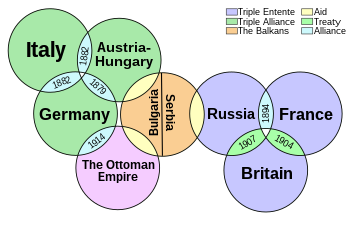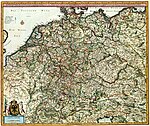
Back مسألة ذنب الحرب Arabic Kriegsschuldfrage German Kriegsschuldfrage Spanish Kriegsschuldfrage French Pertanyaan kesalahan perang ID 戰爭罪責問題 Chinese

| History of Germany |
|---|
 |
The war guilt question (German: Kriegsschuldfrage) is the public debate that took place in Germany for the most part during the Weimar Republic, to establish Germany's share of responsibility in the causes of the First World War. Structured in several phases, and largely determined by the impact of the Treaty of Versailles and the attitude of the victorious Allies, this debate also took place in other countries involved in the conflict, such as in the French Third Republic and the United Kingdom.
The war guilt debate motivated historians such as Hans Delbrück, Wolfgang J. Mommsen, Gerhard Hirschfeld, and Fritz Fischer, but also a much wider circle including intellectuals such as Kurt Tucholsky and Siegfried Jacobsohn, as well as the general public. The war guilt question pervaded the history of the Weimar Republic. Founded shortly before the signing of the Treaty of Versailles in June 1919, Weimar embodied this debate until its demise, after which it was subsequently taken up as a campaign argument by the Nazi Party.
While the war guilt question made it possible to investigate the deep-rooted causes of the First World War, although not without provoking a great deal of controversy, it also made it possible to identify other aspects of the conflict, such as the role of the masses and the question of Germany's special path to democracy, the Sonderweg. This debate, which obstructed German political progress for many years, also showed that politicians such as Gustav Stresemann were able to confront the war guilt question by advancing the general discussion without compromising German interests.
A century later, debate continues into the 21st century. The main outlines of the debate include: how much diplomatic and political room to maneuver was available; the inevitable consequences of pre-war armament policies; the role of domestic policy and social and economic tensions in the foreign relations of the states involved; the role of public opinion and their experience of war in the face of organized propaganda;[1] the role of economic interests and top military commanders in torpedoing deescalation and peace negotiations; the Sonderweg theory; and the long-term trends which tend to contextualise the First World War as a condition or preparation for the Second, such as Raymond Aron who views the two world wars as the new Thirty Years' War, a theory reprised by Enzo Traverso in his work.[2]
- ^ Thoss 1994, p. 1012-1039.
- ^ Traverso 2017, PT35.
© MMXXIII Rich X Search. We shall prevail. All rights reserved. Rich X Search